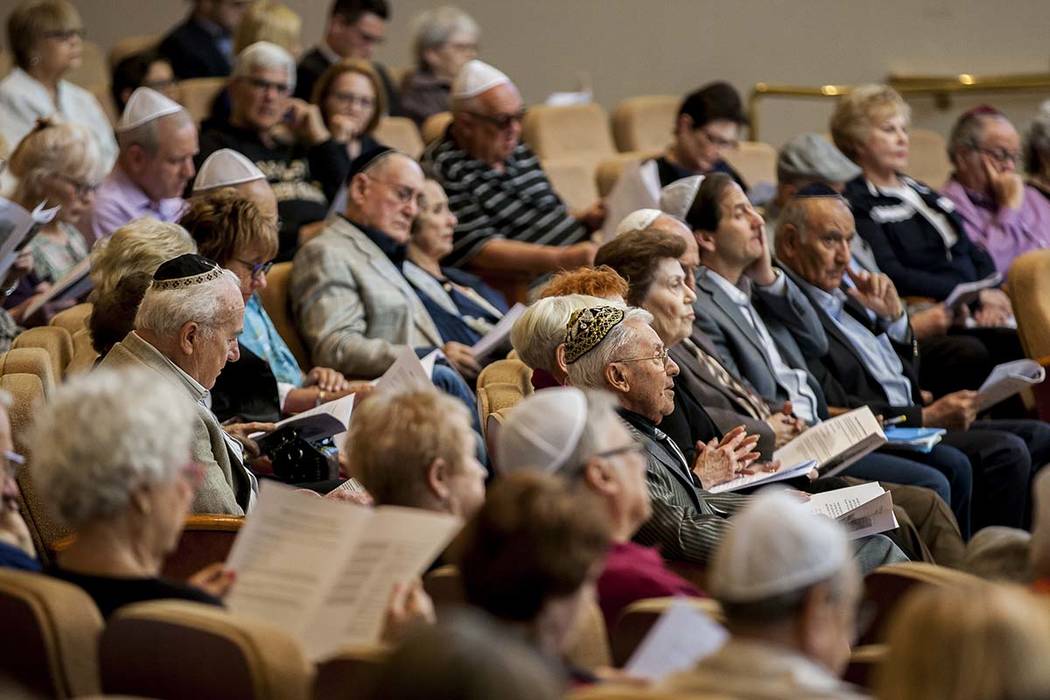Holocaust Remembrance Day vital in wake of recent attacks

With anti-Semitic attacks and harassment at near-historic levels across the country, Yom Hashoah, or Holocaust Remembrance Day, has become even more important to the Jewish community.
It begins at sundown Wednesday and ends at sundown Thursday, but some congregations observed the day on Sunday with music, readings and prayers, and by lighting candles to commemorate the 6 million Jews killed in the Holocaust.
“It’s a chance for all of us, as a community and as a family, to pause and remember lives that were brutally taken,” said Esther Finder, president of the Holocaust Survivors Group of Southern Nevada and Generations of the Shoah.
Finder, whose parents were Holocaust survivors, said it’s especially important for young people to learn about the Holocaust. She said people often politicize the genocide and throw the word Holocaust around carelessly, and in doing so lose sight of the lessons they should learn from it.
“We’re still dealing with it today,” Finder said. “Human nature hasn’t changed.”
Finder said that’s why education is part of Yom Hashoah observance.
“People focus on the victims, but don’t look at the perpetrators,” she said. “You have to remember where it started. It started with hate.”
‘Historic trends’
The Anti-Defamation League released its yearly audit Tuesday documenting “anti-Semitic incidents” of assault, harassment and vandalism. In the U.S., they decreased slightly, to 1,879 in 2018 from 1,986 in 2017. But 2017 had a 57 percent increase from the prior year, and the number of incidents in 2018 nearly doubled from 2015.
“We’re seeing historic trends across the country, and we’re definitely seeing the same trends in Nevada,” said Jolie Brislin, Nevada regional director for the ADL.
She said most anti-Semitic hate crimes in Nevada involve vandalism at schools and synagogues. The ADL works with law enforcement agencies and trains officers to recognize hate crimes against all religious groups.
Stefanie Tuzman, president and CEO of Jewish Nevada, said her organization has a good relationship with local police departments. She said police increased patrols around valley synagogues as congregations gathered on Sunday.
“Extremists have been very emboldened in the past few years,” Brislin said. “Now with the internet, everywhere you turn you can find a group that agrees with you.”
ADL data only includes incidents that were reported. Brislin emphasized the importance of reporting hate crimes so that organizations like the ADL can track them.
“Anti-Semitism is definitely on the rise. But more than that, bigotry and hate are on the rise,” Tuzman said. “So really we’re trying to bring light to our community and all faith-based communities.”
Preserving memories
Each year, Tuzman said, there are fewer Holocaust survivors alive and able to travel and share their stories.
One of them, Ray Fiol, said it’s difficult to share painful memories over and over.
“But I think it’s very important,” she said, “so we don’t see a repetition of World War II.”
She said there is an element of fear in her community because of the rise in anti-Semitic attacks, including Saturday’s shooting at a synagogue near San Diego that left one person dead and three others injured.
“You never know when it’s going to hit,” Fiol said. “You never know who’s going to be hit, whether it’s the Muslim, the Jewish, and we don’t know who’s going to do it.”
Fiol commemorated Yom Hashoah on Sunday by speaking to students about her experience. Next, she plans to speak at Nellis Air Force Base and will travel to Carson City next week for Gov. Steve Sisolak’s advisory council on education relating to the Holocaust.
The Holocaust Survivors Group of Southern Nevada and Generations of the Shoah are working to preserve survivors’ stories so they can reach young people even after they’re gone.
The groups’ interviews with local Holocaust survivors are kept at UNLV and in the Esther Finder collection at the United States Holocaust Memorial Museum in Washington, D.C.
Meanwhile, a bill in the Legislature would create the Nevada State Holocaust Museum. An amendment to the proposed museum bill, which is expected to be adopted, would call for a two-year feasibility study to examine the museum’s logistics, such as the size of the building and the location.
Fiol said she hopes that young people learn at least one thing from her story: “Every human being is equal, and we should respect and honor each other.”
Contact Max Michor at mmichor@reviewjournal.com or 702-383-0365. Follow @MaxMichor on Twitter.